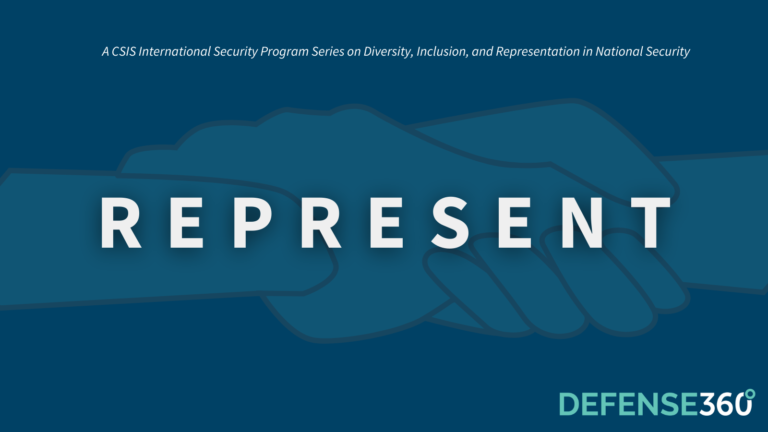How I Got Here
Represent Series

Represent is a series from the CSIS International Security Program on diversity, inclusion, and representation in national security. Wardah Amir shares her story and struggles of a being a Muslim American joining the U.S. national security community and offers hope for creating a more diverse and inclusive field.
A younger version of myself could never have fathomed a career in national security. At eighteen I followed in the footsteps of my grandfather and signed up for engineering school. I was on a traditional academic path taken by many South Asians, to pursue degrees in science, technology, engineering, mathematics (STEM), and medicine. My lack of passion for engineering, and finding a supportive group of people shifted me toward where I am today.
I often reflect on how I got here. To me, it seems like a miracle that a Pakistani American Muslim woman of color who lived most of her life overseas would have the opportunity to work on national security issues at the U.S. Department of State in Washington, D.C. Growing up, I never considered a career in policy making because I did not think it was an option for me.
Three weeks before 9/11, my family relocated to my country of origin: Pakistan. On September 11, 2001, I remember my family watching the news in horror. I recall facing the difficulty of adapting to life in a new country as a young girl, witnessing a heinous attack that made no sense, and not realizing how 9/11 would change life as I knew it. I will never forget the feeling of loss post-9/11 and the burden placed on Muslims to apologize for an act committed by terrorists.
I have come across colleagues in the national security community who were motivated to serve in the security field following 9/11. Although my own motivation to be in this space is driven by a sense of service, it was impacted by 9/11 in a different way. I have lived most of my life searching for acceptance in a post-9/11 world. My Muslim American community has had to prove our loyalty to our own country. For most of my life, I have tried to shatter the stereotype placed on us, and it may be one of the reasons I pursued a career in peace and security: because “peaceful” was not an adjective used to describe my people.
An Organization that Offered Acceptance
In 2018, I joined the Women of Color Advancing Peace and Security (WCAPS), an organization founded by Ambassador Bonnie Jenkins to promote diversity, equity, and inclusion in the peace and security field. I felt redemption. I finally felt appreciated. And I felt unlocked from the shackles of a stereotype that should have never been associated with an entire religious minority group.
Still, my peers and I, who do not often see ourselves represented equally in the national security field, have often discussed imposter syndrome and how to cope with it. When I feel imposter syndrome kicking in, it is not because I lack confidence in my ability to perform, but because I feel so visibly anomalous in the field. I grew up with the media depicting the bad guys as people who looked, dressed, and prayed like me. Following 9/11, my religious identity became synonymous with radicalism and violence. I recognize my presence in the national security community counters this false narrative. But given the lack of diversity, I constantly feel like I am carrying the burden of representing the under- and mis-represented.
Organizations like WCAPS provided me a safe space and introduced me to other women of color whose experiences of representing the underrepresented resonated with my own. My initial memory of WCAPS is a sense of relief that others also felt what I had learned to internalize. Through WCAPS, I found my voice to speak out against the lack of diversity, equity, and inclusion in the field. Furthermore, I realized how important this professional network was, not only to diversify the national security pipeline but also to acknowledge the contributors of color advancing peace and security around the world.
A Support System for Peace and Security Practitioners
In 2020, after the killing of George Floyd, WCAPS launched its Organizations in Solidarity project. While my very existence in the national security field has felt challenged by policies like the “Muslim ban” on travel and immigration to the U.S. and Executive Order (EO) 13950, I choose to remain hopeful about the impact created by WCAPS and hundreds of other organizations and untold numbers of individuals who have signed up to combat racism and discrimination. WCAPS has been a part of my national security story, and it has similarly advanced many other women of color on their peace and security trajectories. No matter the challenges we may run into before we reach an equitable workforce in national security, it is comforting to know that in the interim, these organizations have vowed to implement improvements for practitioners of color to feel more welcome, accepted, and supported.
When I think back to my younger self who felt alienated after 9/11 and had to find her way on her own, I am now grateful for the mentors, believers, and guiding lights who supported me along the way. And while there are still plenty of obstacles to overcome to achieve a diverse and inclusive field, rather than dealing with these issues alone, we have successfully created room to face these challenges together.

